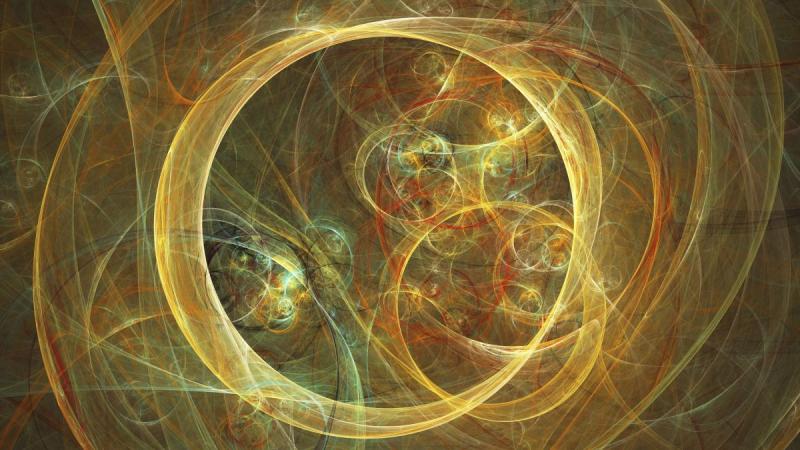Does consciousness explain quantum mechanics?
By: Paul Sutter (livescience. com)


No, consciousness does not explain quantum mechanics. And inappropriately labeling pseudo-science as philosophy does not mark any sort of intellectual prowess. These pseudo-scientific meanderings can just as easily be attributed to legalizing recreational drugs.
Observation only transforms an indefinite understanding of a system into a definite understanding of a system. Observation does not alter the deterministic nature of the system. When the system is constrained, as in a laboratory experiment, then what is observed is only relevant to that constrained system. The danger is extrapolating those constrained observations into general explanation of causal relationships under different conditions. Replication of the constraints will only confirm or refute those constrained observations. Extrapolating the specific to the general requires observation under dissimilar constraints.
A cyclotron may replicate specific conditions found in nature. But extrapolating the constrained observations made with a cyclotron requires demonstrating that the cyclotron is a valid general model of natural systems. Using a cyclotron to make observations forces the system to respond in a specific manner that may or may not describe conditions found in nature. That is how consciousness influences the definite observations. And the ability to impose constraints upon a system to allow observation depends upon that system being deterministic.
The only conjecture that can be made with any degree of certainty is that observation is a quality of consciousness. Extrapolating that philosophic conjecture into a general influence upon the determinism of natural systems is more metaphysics than physics. And it's certainly not philosophy.

One of the most perplexing aspects of quantum mechanics is that tiny subatomic particles don't seem to "choose" a state until an outside observer measures it. The act of measurement converts all the vague possibilities of what could happen into a definite, concrete outcome. While the mathematics of quantum mechanics provides rules for how that process works, that math doesn't really explain what that means in practical terms.
One idea is that consciousness — an awareness of our own selves and the impact we have on our surroundings — plays a key role in measurement and that it's our experience of the universe that converts it from merely imagined to truly real.
But if this is the case, then is it possible that human consciousness could explain some of the weirdness of quantum mechanics?
Quantum measurement
Quantum mechanics are the rules that govern the zoo of subatomic particles that make up the universe. Quantum mechanics tells us that we live in a fundamental nondeterministic world. In other words, at least when it comes to the world of tiny particles, it's impossible, no matter how clever scientists are in their experimental design or how perfectly they know that experiment's initial conditions, to predict with certainty the outcome of any experiment. Know the force acting on a proton? There's no set location where it's certain to be a few seconds from now — only a set of probabilities of where it could be.
Thankfully, this indeterminism surfaces only in the subatomic world; in the macroscopic world, everything operates according to deterministic laws of physics (and no, we're not exactly sure why that split happens, but that's a problem for a different day).
When physicists perform an experiment on quantum systems (for example, trying to measure the energy levels of an electron in an atom), they're never quite sure what answer they'll get. Instead, the equations of quantum mechanics predict the probabilities of these energy levels. Once scientists actually conduct the experiment, however, they get one of those results, and all of a sudden the universe becomes deterministic again; once scientists know the energy level of the electron, for example, they know exactly what it's going to do, because its "wavefunction" collapses and the particle chooses a certain energy level.
This flip from indeterminism to determinism is outright odd, and there is no other theory in physics that operates the same way. What makes the act of measurement so special? Myriad quantum interactions happen in the universe all the time. So do those interactions experience the same kind of flipping even when no one is looking?
The role of consciousness
The standard interpretation of quantum mechanics, known as the Copenhagen interpretation, says to ignore all this and just focus on getting results. In that view, the subatomic world is fundamentally inscrutable and people shouldn't try to develop coherent pictures of what's going on. Instead, scientists should count themselves lucky that at least they can make predictions using the equations of quantum mechanics.
But to many people, that's not satisfying. It seems that there's something incredibly special about the process of measurement that appears only in quantum theory. This specialness becomes even more striking when you compare measurement to, say, literally any other interaction.
For instance, in a faraway gas cloud, deep in the vastness of interstellar space, nobody is around; nobody is watching. If, within that gas cloud, two atoms bump into each other, this is a quantum interaction, so the rules of quantum mechanics should apply. But there is no "measurement" and no result — it's just one of trillions of random interactions happening every day, unobserved by humans. And so the rules of quantum mechanics tell us that the interaction remains indeterministic.
But if those same two atoms bump together inside a laboratory, scientists can measure and record what happened. Because a measurement occurred, the same rules of quantum mechanics tell us that the indeterminism flipped to become deterministic — that's what allowed me to write down a concrete result.
What's so different between these two cases? Both involve subatomic particles interacting with other subatomic particles. And every step of the measurement process involves subatomic particles at some level, so there shouldn't be an escape from the usual quantum rules that say the outcome should be indeterminate.
Some theorists, such as pioneering quantum physicist Eugene Wigner (opens in new tab), point out that the only difference between these two scenarios is that one involves a conscious, thinking observer and the other does not. Thus, what's called a "collapse" in quantum mechanics (the transition from indeterministic probabilities to a concrete result) relies on consciousness.
Dreams of the universe
Because consciousness is so important to humans, we tend to think there is something special about it. After all, animals are the only known conscious entities to inhabit the universe. And one way to interpret the rules of quantum mechanics is to follow the above logic to its extreme end: What we call a measurement is really the intervention of a conscious agent in a chain of otherwise mundane subatomic interactions.
This line of thinking requires consciousness to be different from all the other physics in the universe. Otherwise, scientists could (and do) argue that consciousness is itself just the sum of various subatomic interactions. If that's the case, there's no end point in the chain of measurement. And if so, then what scientists do in the laboratory really isn't any different from what happens in random gas clouds.
While not strictly a physical theory, the concept of consciousness as different and separate from the material universe does have a long tradition in philosophy and theology.
However, until someone can figure out a way to test this concept of consciousness as separate from the rest of the physical laws in a scientific experiment, it will have to stay in the realm of philosophy and speculation.






Somebody needs a new drug. These metaphysical notions, under the guise of philosophy, appear to arise from an hallucinogenic haze. The idea of mind control over nature reeks more of black magic than philosophy.
This author has listened too much to the bullshit artist Deepak Chopra.
IMO this is a recurrence of metaphysics creeping into science when an area of scientific study bumps up against the limits of present capabilities. To me it seems to be motivated by a desire to remain relevant. Sexy science (arising from new discoveries) will gradually lose its sex appeal as knowledge increases. The progression of scientific effort does transform the cutting edge of science into the mundane.
Even Einstein dabbled in metaphysical conjecture from time to time. A scientific breakthrough can only occur once. And each breakthrough gradually progresses to the limit of capability. How does a scientist working on the cutting edge of science remain relevant?
One popular hypothesis is that when observed, the observer becomes entangled with the observed. This is the multi-worlds interpretation where all possibilities exist in distinct dimensions.
Gotta love that cat. Of course, you can't argue against it...
No.
Shit, we still don't even understand consciousness and that is the lens from which we understand everything else. We don't understand how we understand anything else.
You might want to read “The Origin of Consciousness in the Breakdown of the Bicameral Mind” by Julian Jaynes.
Why? What observable evidence will it provide me when it comes to consciousness?
It's doubtful that human thought affects the Universe. It's existed and done it's thing for billion's of years without our observation, participation, or interpretation.
But the experiments continue with interesting results.